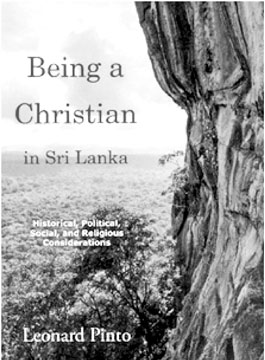|
Book
Review
A serious reflection on a nation's crisis
Leonard Pinto, an ecologist and an author of works on ethics and
social justice, has taught and researched at universities and industry
in Australia, the Philippines and Sri Lanka. In this enjoyable book, he
has put together a vast amount of information on historical, political,
social and religious matters with lucid analysis and sober reflections.
 The
theme of the book is the contemporary Sri Lankan situation. In the
recent decades, Sri Lanka has received global attention as a place of
explosive violence. Conflicts have mainly arisen from the nation's
inability to deal with its internal tensions, which have been caused by
economic and political inequalities, as well as ethnic, religious and
cultural divisions. The
theme of the book is the contemporary Sri Lankan situation. In the
recent decades, Sri Lanka has received global attention as a place of
explosive violence. Conflicts have mainly arisen from the nation's
inability to deal with its internal tensions, which have been caused by
economic and political inequalities, as well as ethnic, religious and
cultural divisions.
Timely reminder
Sri Lankan-born Leonard Pinto demonstrates a profound concern about
the nation's plight and considers that Sri Lanka can become a stable and
prosperous nation on the basis of its people arriving at a common
national identity while accepting, or in fact celebrating, diversity as
part of its rich historical heritage.
This book is a timely reminder of the traumatic impact of the
national identity crisis caused by a discourse created by a group of
narrow-minded 'intellectuals' for political gain. That discourse is
known infamously as the 'Sinhala-Buddhist cultural identity', created
with the view to achieve a few advantages at the cost of pushing the
nation as a whole into a kind of 'social schizophrenia'. Pinto gives
some examples of the teachings of these so-called Sinhala Buddhist
intellectuals, who talk about 'Buddhist mathematics, the need to reject
western philosophy and that Christianity has been born out of Buddhism',
along with other rhetoric against minorities. This cultural identity
today contributes to the economic, social, political and cultural ruin
of the country as a whole. It has also caused international disrepute to
Sri Lanka.
The book consists of the following chapters: Historical Aspects of
Christianity in Sri Lanka; Western Christianity and its 'Inculturation'
in Sri Lanka; Sinhalese and Tamil Christians; Service through Christian
Institutions; Unity in Diversity: Freedom in Christian Thought;
Teachings of Jesus and the Church; Does God Exist?; Ethics and Christian
Morals; Buddhist Sinhala Nationalism; Propaganda against Christians;
Buddhism, Hinduism and Islam in a Pluralistic Society; Marxism and
Materialism; Science and Religion; The Power of Prayer; and Future of
Christianity (Catholicism) in Sri Lanka.
Pinto argues against the rather narrow-minded criticisms and false
propaganda against Christians that have arisen mainly out of the type of
nationalism that emerged after Sri Lanka's independence in 1948, when
there were attempts to build narratives about the greater importance of
one ethno-religious group against all others. He demonstrates the
falsity of this narrative and the depth of the damage this has caused to
the unity of the nation.
The underlying theme of the book is to argue for a saner approach to
understanding and appreciating each other, thus creating a firm basis
for generating internal strength, which should be the aim of developing
an authentic narrative about the nation.
As one continues reading, one cannot help but be sad about the
pathetic plight that Sri Lanka has gotten into, mainly due to its
inability to transcend petty disputes and generate a nobler moral and
ethical sensibility for the foundation of the nation's stability and
prosperity. The author exposes the nonsensical nature of the
misinterpretations of many elements of history, and the type of
argumentation that 'misguided nationalists' have pursued in the past
decades.
Pinto also tries to correct a common misconception in attributing all
that is evil to 'videeshiya akramana' (foreign invasions), meaning the
occupations by the Portuguese, the Dutch and the British and points out
that these invasions "in reality happened after the Sri Lankan Kings
invited them."
Cultured people
Talking about what the Sri Lankan identity needs to be, Pinto writes
that the basis of this identity should be 'culture'. By culture, what he
refers to is the refined way people think, act, communicate, make
decisions and demonstrate their values and taste.
Pinto says, "cultured people do not look down on others, because of
their status, origins, religion, colour or the language they speak.
Cultured people value humanity, as a whole and practice, 'love your
neighbour as yourself'. So the cultured people can be found among
different ethnic groups, as well as among religious groups. They can be
found among the rich and the poor and those who can and cannot speak
English. Culture refers to values, and civilisation to organisation."
[p.491]
A careful reader would note the importance that the author attaches
to religious diversity as a source of strength in consolidating a nation
based on values common to all religions.
Thus, the criticisms the author makes against the so-called Sinhala
Buddhist discourse is a call to return to the powerful original teaching
of the Buddha himself.
This is quite a timely book. It is not only the work of a seriously
concerned citizen, but also of a scientist, who has seriously reflected
on his nation's crisis and thought it fit to devote many hours to
writing this comprehensive book to place before his people and the world
his thoughts for their kind consideration.
One can only hope that sane counsel will prevail in Sri Lanka and
that this committed Sri Lankan intellectual is given the consideration
that he deserves. |

